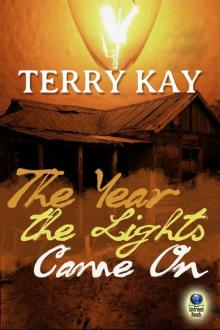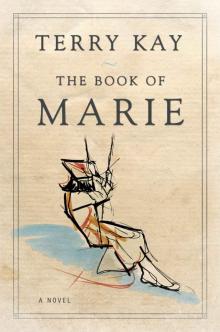The Book of Marie Read online
Page 2
The letter was signed:
With affection,
Alyse
There was a P.S.
By the way, do you know how to reach Marie Fitzpatrick? She may have been different, but she was a member of our class and we want to make sure she gets an invitation. If you know anything about her, please let me know, or you could just ask her about coming. Are you freezing up there in Vermont? It snowed here last week, almost two inches deep. It was pretty, but I couldn’t take being knee-deep in it. And thinking of snow reminds me: Merry Christmas.
And there it was: the name.
Marie Fitzpatrick.
The name caused him to lean back in his chair, to sit for a long time, holding the letter from Alyse Pendleton.
And then he pushed himself from his chair and went into his office, to a rolltop desk. He took a small key from a polished mahogany box once used to hold cuff links and then he opened a drawer filled with letters, neatly arranged. He removed one at random and opened it, reading it again, reading the words, though he knew most of them from memory.
Dearest Cole Bishop,
I think I am a little tipsy, my beloved fool-friend. I wish you were here with me. We could be tipsy together, and we could celebrate my new life. Oh, yes, Cole, there is a new Marie. I have decided to abandon my ambition of becoming the world’s grandest surgeon to become the world’s grandest attorney.
I can see you now, as you read this—mouth flapping open, eyes blank and staring at the page, your little one-cylinder mind churning away with some feeble argument about my erratic behavior. It doesn’t matter, Cole; your argument would be useless, as always. And, no, my decision has nothing to do with failing grades. The truth is, I’m teaching about half of the classes I’m taking, but I’ve lost the passion, Cole—that wonderful burning that has always made me do things. Also, I’ve been having visions lately, visions of standing before a judge in some severe courtroom, locked in mental combat with a shyster from a multi-trillion dollar law firm, and I am kicking him in the balls, Cole. I am defending some good, but helpless person (like you), who doesn’t have a snowball’s chance in hell of beating the system. But I beat it. I tear it asunder. I destroy it.
Isn’t that also a noble calling, Cole? Isn’t it? I mean, what good is a healthy heart if the hope flowing through it is being devoured by the cancer of The Takers? And I’ve seen it, Cole. Too many times. I have seen the great masses—you may remember them; you used to think of them as your audience—wandering lost, trying to do things the right way, but being squashed by power-hungry men believing they are God.
I want to see people win who have never won. I want to win for them.
Wouldn’t you like this new Marie, Cole? Wouldn’t you want to stand beside her? Wouldn’t you want her to have your children?
Oh, God, I miss you so much at times. How can I enjoy grandiose dreams without you, my fool-friend, the Jester of Dreams?
But I do warn you: I will not represent you pro bono when you are sued for alienation of affection by some moon-eyed little coed who falls for your smooth talk. Even I cannot defend inane bullshit.
Ain’t life wonderful, Cole Bishop? Don’t you love me?
She had written the letter when she was a senior at Harvard. Two days later, he had received another letter from her, informing him she must have been drugged by someone. She would never be an attorney. Attorneys were asses. She hated attorneys.
If I frightened you, or made you glad, Cole, I apologize. The fact is, I was destined to be a doctor. I guess my actions prove you were right with that silly drivel you used to quote: Look before you leap. Well, I’ll remember it now. You should too.
He had responded with a bellowing of triumph, telling her he was pleased she had finally learned something he knew all too well. She had returned the letter, with his boasting underlined and a single, over-sized word written in the margin with the wide tip of an ink pen. The word was Ha!
The letter he wrote to Alyse Pendleton, saying he would attend the reunion, contained one carefully worded reference to Marie Fitzpatrick: I’m afraid I can’t help in the search for Marie.
It was a statement of part-truth, part-lie—the hedging of not-saying and, to Cole, the employment of good sense. From their first meeting, Marie Jean Fitzpatrick had had power over him, much the same as a wizard casting spells in some children’s story, and it did not matter that he had last seen her the night of their graduation from Overton High School. She had vowed she would be peering forever over his shoulder, always at unexpected times, taunting him with her wisdom, and for a half-century, it had seemed that way, appearing as she did from memory-codes as distant as the music of their youth or as immediate as a stranger’s face—usually a new student—having her features.
Now she had returned in a letter from Alyse Pendleton, and he knew she would not easily leave him.
He was right.
That night she appeared in a dream, wearing her white high school robe of graduation, sitting in a child’s swing, swinging high in the air, so high she touched stars with her toes. And then she was standing near him, her face tucked against his chest, and she was saying, I do love you, Cole Bishop.
The dream ended and he awoke exhausted, a coating of perspiration across the top of his chest.
He thought, My God, where did that come from?
He looked at the digital clock on the bed stand and saw the time was closing in on midnight.
He said aloud, Go away, Marie. It was gently spoken, with some weariness in his voice.
From somewhere in the room, deep in his imagination, he heard her snicker.
He lay in his bed, listening, believing the dream of her was from the melancholy of the season of Christmas, being alone as he was. Mind tricks brought on by age. One minute in childhood, the next minute bone-weary by too many years too quickly lived. Age leaving its calling card—faint, tell-tale wrinkle-scarring on his skin, the beginning of a sag on his chin line under his beard, small brown liver dots, like freckles, on the back of his hands, a slight loss of hearing. Age playing with his mind, also, and he knew it, knew he was a tick slow in his reasoning and in the repartee that had served him well among colleagues and students. In the last year or so, he had jokingly been called a curmudgeon, had been teased over memory lapses that struck him like strobes of white light. There were many questions about his retirement plans, some in jest, some serious.
Putting all of it together—being alone as he was in the melancholy of the season of Christmas with age playing its tricks—it was not a surprise to him that Marie Jean Fitzpatrick had come calling in the middle of sleep, keeping her promise to peer over his shoulder at unexpected times.
She would find delight in Alyse Pendleton being a medium for her appearance, having found Alyse tediously predictable in their youth.
Patience, he thought. He would have to practice patience.
Her presence would eventually disappear.
It always had, given time.
Again, he heard her laugh. Almost real. Real enough to have an echo.
He pushed back the covering and rolled off the bed and made his way into his office and went to a bookcase and eased a worn book from the top shelf and opened it to a page marked by a small Christmas card shaped in the face of a Santa Claus laughing a jolly laugh.
On the page, he saw the word and the word caused a smile.
He had celebrated only one Christmas with Marie during the period of the blithe charade they had called dating. On Christmas Eve 1954, alone in the living room of her home, beside a Christmas tree lavishly decorated, he had given her a bracelet engraved with her initials and a small bottle of perfume that Amy, his sister, had selected.
I think you should kiss me, too, Cole Bishop, she had said softly, but if you do, I’ll cry. A moist film had filled her eyes. It’s the first time a boy’s ever given me anything.
It didn’t cost much, he had replied stupidly.
It did to me, she had cooed. To me, it cost a million
dollars. She had hugged him quickly, then stepped away and looked at the bracelet on her wrist. I’ll wear it forever. I won’t ever take it off.
Really, it’s not expensive, he had insisted. It’ll probably turn your skin green.
And the perfume, she had said excitedly. The next time we have a date, I’ll wear it, and I’ll tell everybody that it’s called Passion On Hold, and that you gave it to me to keep until our wedding night, but I took out a drop just to remind me of you.
Don’t go overboard, he had warned.
I bet you think I didn’t get you anything, she had countered.
If you did, you didn’t have to. I mean, it’s not like we’re really going steady, or anything like that, no matter what people think we’re doing.
Well, I did. I got you something you need.
What?
She had reached beneath the Christmas tree and removed a package. He knew it was a book by the shape of it and it was—a thesaurus.
Do you like it? she had asked hopefully.
Uh, sure, he had answered.
No, you don’t. I can tell by your face.
Sure, I do, he had insisted. I just sort of thought it would be a novel.
You can get novels anytime, but you need this. It’ll help broaden that pitifully limited vocabulary of yours.
My vocabulary’s as good as yours, he had argued.
No, it’s not, Cole. It’s all right, but it’s not as good as mine.
Merry Christmas to you too.
Quit acting hurt, Cole. All right, your vocabulary’s great. I mean it. You can talk to me, and I understand you, don’t I?
Thanks a lot, Marie.
She had taken the book from him and had opened it to a page marked by the Santa Claus Christmas card signed, Fondly, Marie. I underlined a word for you, she had said.
The word was escape.
What’s that supposed to mean? he had demanded.
Memorize it, Cole, she had answered. Years from now, without me to protect you, you’ll need to know all the words you can about escaping.
From what?
From everything you can’t handle.
He had looked at her closely. She was smiling, but there was sorrow in her eyes.
You know, you’re strange, he had said.
I know, Cole, she had whispered. Merry Christmas.
Some of the synonyms for escape were: avoidance, elusion, shunning, flight, lam, slip, eschewal.
Over the years, he had used them all.
He closed the book and placed it back on the shelf and went into his kitchen and took a container of orange juice from his refrigerator and a glass from the cabinet. He stood for a moment, holding the orange juice, then reconsidered his desire for it and put it back into the refrigerator. He realized he had begun to do such things, and for some reason the refrigerator seemed part of it, the same as a plot-reference in a mystery novel. How many times had he opened the door to the refrigerator lately when wanting to use the microwave? Or how many times had he discovered the salt and pepper shakers near the milk? Often. Too often. And it was not the only time he had taken orange juice from the refrigerator, not really wanting it. Three nights earlier—the night of the party for Grace Webster—he had done the same. He thought of Tanya Berry. Tanya would razz him mercilessly. Tanya would turn the unwanted orange juice into a metaphor the equal of Jesus turning well water into wine, and if not that, she would compare the refrigerator to Pandora’s Box, or to some mausoleum filled with the icy spirit of demons.
He shook his head, chuckled hard enough over his meandering thinking to make sound rise from his throat, and he wondered why Tanya Berry had leapt into his mind. She had been one of his most cherished friends for twenty years, a sister-like colleague at Raemar University, yet he knew there was more than friendship at play in the moment. Tanya was also a brilliant clinical psychologist, a woman who had earned her liberation from a middle-class Philadelphia neighborhood by being assertive and blunt, using a sailor’s language when the occasion invited it. She had long teased that one day, due to his bouts with boredom or from the emptiness of his day-dreaming ways, he would come begging for her professional services. Someday, she badgered. You wait. Someday, you’ll come crawling. Someday you’ll understand you can’t find all your answers in books.
And maybe that time had come, he thought. Maybe with the letter from Alyse Pendleton and with the dream-presence of Marie Fitzpatrick still hovering in his home, he had reached the tell-all stage of his life and talking about it to Tanya Berry would clear away some of the confusion. It had worked for other people that he knew—or so they had claimed.
Yet, Tanya was wrong about one thing: he would not go crawling. There would be no trembling, no begging for help, no howling cries of need.
He was not a crazy person.
Aging, perhaps, but not crazy.
At five o’clock, he awoke again from a weighty sleep. He was again lathered in perspiration, again heard the voice of Marie Fitzpatrick in the room with him, the voice saying, Do you think you can hide from me, Cole Bishop?
He licked his lips and realized his mouth was dry. In the dark of the room, he could sense her watching him. A great chill struck his body, causing him to convulse violently in the tangle of his bedcovering.
At eight o’clock, he called Tanya Berry.
I think I need you, he said weakly.
The call surprised her. She could hear quaking in his voice. She said, Cole, this isn’t one of your jokes, is it?
No, he replied, his voice dropping to a whisper. No, he repeated.
All right, she told him. Nine o’clock. My office.
TWO
He would write about the way Marie Fitzpatrick came into his life because Tanya Berry insisted he do so, telling him it would help set the memories straight, and if he had the memories straight, he would be able to follow them back to some understanding.
Do it little by little, she said. Begin at the beginning. Each day, write something. You’re on sabbatical next semester, aren’t you? It shouldn’t be difficult for you. You’re a teacher.
Of literature, not of writing, he protested.
Excuse me, she said. I believe you won the National Book Award for biography, did you not?
A fluke, he mumbled. And it was fifteen years ago—or longer.
I hear it was good stuff, she countered. One of these days, I’ll have to read it.
He smiled, knowing she had celebrated his award by using portions of it in her counseling. She had even quoted lines to turn the tables on him in their harmless arguments.
Don’t quibble with me, she added. Words are words are words. Start at the beginning and for God’s sake, don’t think of it as an essay you’re writing for some tight-assed literary journal. Just write, Cole. Just do it. Forget the rules. If I see anything that even resembles iambic bullshit, I’ll rip your heart out. Just write.
And so he did.
On Sunday, two days following his counsel with Tanya Berry—having no other purpose to occupy his time and needing something to assuage the trembling that struck him unexpectedly at unexpected times—he went into his office and opened the laptop computer on his desk. He keyed in a new folder that he titled, without reason, MARIE, and having written her name, a sentence came into his mind: This is how I remember meeting Marie Jean Fitzpatrick.
He began to write.
December 19, morning
This is how I remember meeting Marie Jean Fitzpatrick.
I am dressed in a purple short-sleeved shirt that is rolled once at the sleeves, the collar turned up to scrub against the feathers of my ducktail haircut. The beltless blue jeans I am wearing, fitting snug on my hips, are starched and the legs ironed in the blade of a crease. A pair of white athletic socks dangle from one back pocket like a flag. My new loafers, still glittering from the oil of the leather, click sharply on the wood flooring. The spearmint taste of chewing gum is in my mouth. Aftershave lotion—too powerful and unnecessary— surrounds me. A smile,
proud and smug, worms across my face.
Perfect.
It is near-autumn 1954, and my life is perfect.
Dreamy, yes, but perfect.
I have waited two years to be where I am—in the epicenter of the wad of bodies that move in a swagger along the corridor of Overton High School. My eyes wander over the awed faces of students who are swept against the walls of the corridor by the tide force of those bodies that surround me. I do not hear anyone speak, but I am certain I know what they are saying.
Whispers.
“There he is,” the whispers are saying. “That’s Cole Bishop. He’s the quarterback.”
I can see the gaze of girls giddy with dreams of adolescent passion, can hear their sighs, their muted giggles of excitement.
I do not believe any of my teammates understand it, but the march of the Overton High School Purple Panthers through the hallways of Overton High School on the first day of school, 1954, is as ritualistic as ancient warriors conquering a city. Attila the Hun, Alexander the Great, Napoleon Bonaparte. All of them had made such marches, surrounded by men who would protect them. Still, I am not foolish enough to make an issue of it with my teammates since they likely have never heard of Attila or Alexander or Napoleon, but, to me, there is little difference between a General and a quarterback.
A half-dozen boys scamper through the opened door of a classroom, and Lamar McDowell, who marches in front of me, his wide body moving like the bow of a ship, growls at them. “Cockroaches,” Lamar says.
We move on, our footsteps echoing in gunshots of hard-rubber heels on wood.
“Go Panthers,” a voice calls from one of the rooms. Lamar flips a stubby-fingered bird toward the room. A giggle wings back toward us. Lamar’s gesture is like a blessing. It will be talked about for weeks, for years. In small schools, small moments are memorable.

 The Year the Lights Came On
The Year the Lights Came On To Dance With the White Dog
To Dance With the White Dog The Book of Marie
The Book of Marie After Eli
After Eli To Dance with the White Dog: A Novel of Life, Loss, Mystery and Hope (RosettaBooks into Film)
To Dance with the White Dog: A Novel of Life, Loss, Mystery and Hope (RosettaBooks into Film)